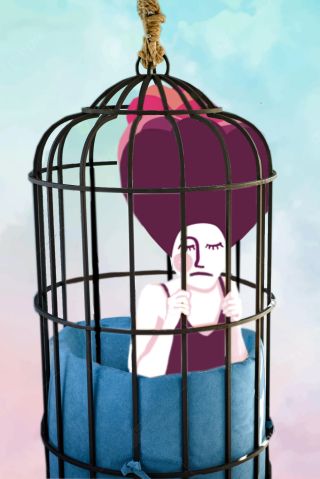Friends
The Likability Cage: Are Women Still Trapped?
A Personal Perspective: Why being liked still feels safer than being real.
Posted February 11, 2023 Reviewed by Vanessa Lancaster

Thirty-five years ago, my sorority sister was raped at a fraternity party. She didn’t report it for reasons we can guess, having heard this story a thousand times by now.
Indeed, it was the clichéd story: the popular, handsome fraternity boy from a powerful family who happened to be a big donor to the university was the attacker. Socially important, he was someone you needed to like you–so that others could like you. Adding to the cliché, my friend had imbibed some spiked punch that night and was flirtatious with the guy, who later drugged and sexually assaulted her.
She understood as we all did at the time, that the benefits of reporting weren’t worth the consequences in the form of judgments (from women and men), dismissal, punishment, shaming, and, ultimately, rejection. My friend wasn’t willing to risk being labeled one of those difficult, overly dramatic women who thought being sexually assaulted was worth harming a cool guy’s future and possibly staining the whole sorority’s reputation. No, she needed to roll with whatever had happened to her so that everyone else could keep having a good time. She wasn’t going to give up her status as likable–no matter what it cost her.
Despite having heard this story countless times since then, I somehow believed that my sorority sister’s experience and the choices she made–and thought she could make–would be fundamentally different now.
But I was wrong.
Last month one of my close friends told me that her daughter was raped at a fraternity party at the university where she’s a sophomore. Like my sorority sister, this young woman had returned home the morning after the assault, dazed and foggy from the event, wearing no coat or underwear.
Hearing of my friend’s daughter’s assault, my first thought was that it could easily have been my own daughter, who attends fraternity parties each weekend at her university. Once I recovered from that terrifying thought and its accompanying adrenaline, I asked my friend if her daughter was planning to report the incident to the university or the police. She replied “no,” because her daughter was convinced that “nothing would happen even if she did.” The young woman also was certain that she would be blamed since she was drunk the night it happened. Furthermore, she didn’t want to be seen as one of those girls who created problems for everyone else. Just as my sorority sister had known, my friend’s daughter also knew that her social standing, security, and survival all demanded silence–still.
It’s been 35 years since my sorority sister was sexually assaulted. Yet, how far have we really come? Today’s young women also understand that if they tell an inconvenient or displeasing truth, they will be judged, labeled, dismissed, blamed, and ultimately rejected, which they view as more dangerous than accepting the unacceptable and suffering in silence. Many women still believe that the best way to take care of themselves is to be likable–no matter the cost.
Women lost a lot of freedoms last year. We’ll fight to get them back, which I believe we will, eventually. But even as we take on the obvious assaults on our freedom, we must also dismantle the subtler forms of our cultural incarceration, the bars of the likability cage within which we live on a daily basis.
We can’t be authentic and empowered while simultaneously trying to always be likable. We’ve been conditioned to believe that our survival relies on our likability and our success on other people’s perceptions. These assumptions keep us captive and silent from one generation to the next.
As we embark on 2023, I hope that women of every age realize that the door to the likability cage, in fact, opens from the inside.


